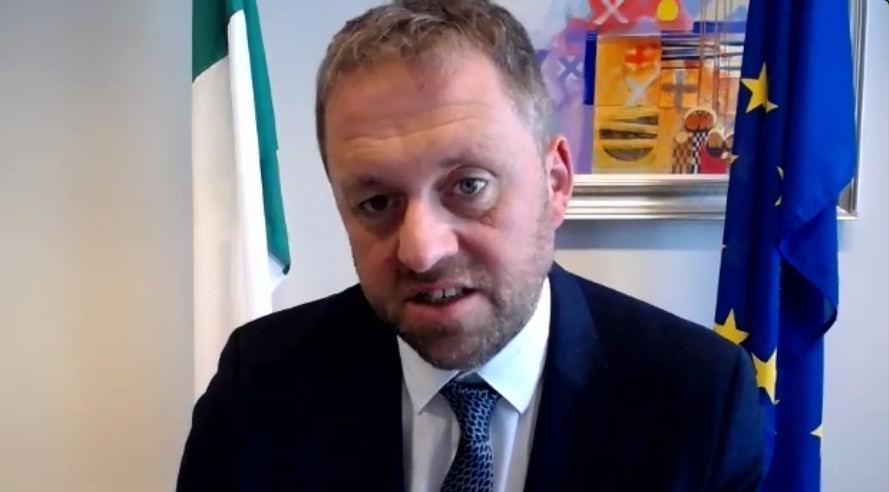Government taking EU criticism over number of judges ‘very seriously’

Thomas Byrne appearing over Zoom
European affairs minister Thomas Byrne has said the government is taking EU criticism of the low number of Irish judges “very, very seriously”.
Speaking at a virtual meeting hosted by the Irish Council for Civil Liberties (ICCL) yesterday morning, Mr Byrne said the judicial planning working group announced earlier this year would deliver its report to ministers by the second quarter of 2022.
The Zoom meeting was held to launch and discuss the Irish country chapter of the European Commission’s 2021 rule of law report, which raised concerns around the judiciary and legal system, the legislative process and anti-corruption measures, among other issues.
The EU report notes that Ireland’s “number of judges per inhabitant remains the lowest in the EU, which could also affect the efficiency of the Irish justice system” – and suggests that “more immediate measures” are needed to address the issue.
ICCL executive director Liam Herrick said it was “fair to say the Commission, in its report, expresses some serious concerns, even in the context of the proposals for reform”, pointing out it had already acknowledged the establishment of the working group.
The report also raises concerns about the government’s proposals for reform of the judicial appointments process, especially around the role of the Attorney General as a member of the proposed judicial appointments commission.
“The membership, even if in non-voting capacity, of the Attorney General, who is also the government’s chief legal advisor and sits at cabinet meetings, might raise concerns as regards the independence of the commission from the government, as reported by the Human Rights and Equality Commission and the Law Society,” it states.
Mr Herrick, who welcomed Mr Byrne’s participation in the event as a “powerful expression of the Irish government’s commitment to being held accountable”, said Ireland is now in “a crucial period in terms of the judicial appointments reform and the embedding of the new Judicial Council”.
He said it was “clear that this year and next year will be crucial” in terms of changes to the judiciary. “What we know now is that the EU Commission will be watching developments here closely,” he added.
Professor Gavin Barrett of UCD Sutherland School of Law told the event that rule of law backsliding in Hungary and Poland had precipitated a “veritable rule of law crisis for the European Union”, which represented “a greater problem than Brexit is or ever has been”.
He said EU reports on the rule of law situation in various countries were only useful in “dealing with states which are genuinely interested in pursuing the rule of law” and not those which are not.
Linda Ravo, senior advocacy consultant at European NGO Liberties, said backsliding was not just about “extreme cases” such as Hungary, Poland and Slovenia, but concerns that are “common to many member states”.
She highlighted “challenges to media freedom, the shrinking of civil space and the weakening of checks and balances [due to Covid-19]” among issues affecting a wider range of EU countries.










